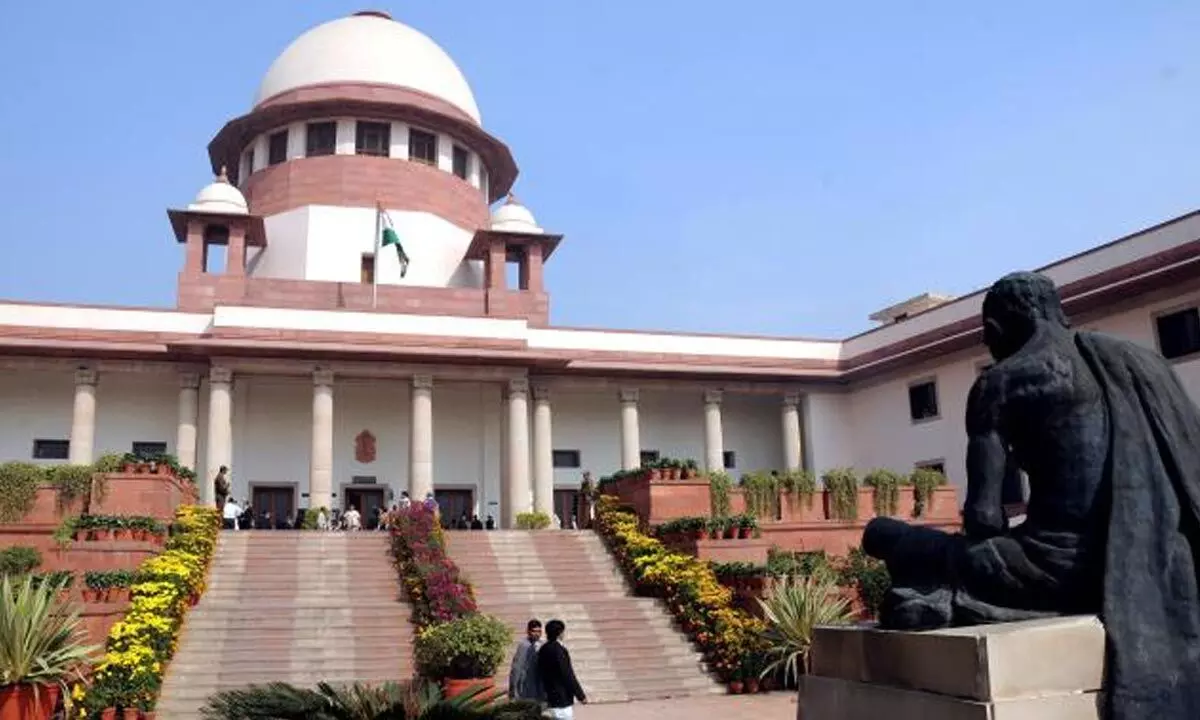Live
- Mandal Level CM Cup Sports Concludes in Ija with Promising Talent and Enthusiastic Participation
- Harish Rao Slams Revanth Reddy: "More Talk, Less Action"
- Revolutionising Oil and Gas: Gaurav Kumar Sinha’s AI-Driven Innovations Transforming Efficiency and Profitability
- Vishal Jain to head AiDASH facility
- Congress Central Election Committee has finalised the names of around 20 candidates for the upcoming Delhi Assembly elections
- District Collector Adarsh Surabhi has ordered to expedite the land acquisition process related to irrigation projects in the district
- Economics and Public policy gets new platform in Bengaluru
- Residents Demand Action After Accidents Highlight Poor Road Safety Measures
- Rahul Gandhi Visits Hathras Victim's Family, Slams BJP For Injustice
- Nitin Gadkari Admits India's Road Safety Crisis, Urges Change In Human Behavior And Infrastructure
Just In
Mumbai riots: Supreme Court issues directions on compensating victims' families, tracing absconding accused


Supreme Court of India
The Supreme Court on Friday issued a slew of directions for payment of compensation to the families of victims in the 1992-93 Mumbai communal riots and also for the revival of dormant cases, by constitution of a special cell, in connection with absconding accused.
New Delhi: The Supreme Court on Friday issued a slew of directions for payment of compensation to the families of victims in the 1992-93 Mumbai communal riots and also for the revival of dormant cases, by constitution of a special cell, in connection with absconding accused.
A bench of Justices Sanjay Kishan Kaul, Abhay S. Oka, and Vikram Nath noted that Article 21 of the Constitution of India confers a right on every citizen to live with human dignity and it encompasses into itself the right to live a meaningful and dignified life.
"If the citizens are forced to live in an atmosphere of communal tension, it affects their right to life guaranteed by Article 21. The violence witnessed by Mumbai in December 1992 and January 1993 adversely affected the right of the residents of the affected areas to lead dignified and meaningful life. It cannot be disputed that certain groups were responsible for the large-scale violence in December 1992 and January 1993," it said.
Justice Oka, who authored the judgment on behalf of the bench, said one of the root causes of their suffering was the failure of the state government to maintain law and order. Therefore, the affected persons had a right to seek compensation from the state government, he added.
During the hearing, the bench had asked the state government whether 168 people, on the missing list, were included among the 900 identified victims. The Maharashtra government had provided Rs 2 lakh compensation to the riot victims and it was paid to their legal heirs.
The bench noted that although 168 persons were reported to be missing after the riots, the state government told the court that it could pay compensation to only the families of 60 missing persons, as the legal heirs of the others could not be traced.
"The state government will also place material regarding efforts made to trace family members of 108 missing persons who have been deprived of compensationa... the state government shall make all possible efforts to trace the legal heirs/family members of the missing persons," it said.
The top court said the state government would provide details of 97 cases on dormant files to the Registrar General of the Bombay High Court within one month from Friday. It added that on receipt of the details, the high court should issue necessary communication to the courts concerned in which the cases are pending to take necessary steps to trace the accused.
"The state government shall immediately constitute a special cell to trace the absconding/missing accused in these cases and to assist the concerned courts so that the trial can proceed against them," it said.
"The state government shall pay compensation of Rs 2 lakh to the legal heirs of the missing persons traced out hereafter, with interest at the rate of 9 per cent per annum from 22nd January 1999 i.e. from the expiry of the period of six months from the date of the second government resolution, till actual payment."
The top court also constituted a committee headed by the Member-Secretary of the Maharashtra State Legal Services Authority (MSLSA) to monitor the implementation of the directions issued in the judgment.
"The state government shall appoint a revenue officer, not below the rank of Deputy Collector, and a police officer, not below the rank of Assistant Commissioner of Police, who shall be the other two members of the Committee," it added.
The bench added that the committee shall monitor the efforts of the state government to trace other victims who were entitled to compensation. "The victims identified hereafter shall also be paid the compensation with interest at the rate of 9 per cent per annum from 8th January 1994 i.e. from the expiry of the period of six months from the date of the first government resolution, till actual payment," said the bench.
The top court said the state government should comply with the requirement of submitting necessary details to the committee within a period of two months from Friday. "The entire exercise of payment of compensation and/or interest shall be completed by the state government within a period of nine months from today," said the bench.
The top court passed these directions while disposing of a writ petition filed by Shakeel Ahmed in 2001 seeking implementation of the recommendations of the Justice Srikrishna Committee report, which was constituted by the Maharashtra government to probe into the riots.

© 2024 Hyderabad Media House Limited/The Hans India. All rights reserved. Powered by hocalwire.com






